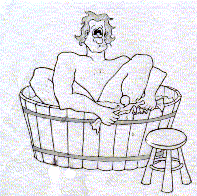
What was Fet like in the year 1000 with respect to cleanliness? We know very little about it. The sagas did not concern themselves with the subject. We do know that 'lørdag' (Saturday) comes from the word 'laugerdag' which means bathing day. But the people of Fet were also a part of the Nordic culture, so it is reasonable to expect that what was normal other places in Scandinavia was also the norm in Fet. And then there is this problem with the literary arts in Scandinavia at that time! One leave Scandinavia in order to find written sources.

The Arab Ibn Fadlan met Vikings in Russia,and he described them as being
unclean..and even worse. (But the people he met were people on a difficult
journey).
What were Scandinavians like when they were home or when they stayed in one
place for a while? There is a description from England and it paints a much
nicer picture of Scandinavian cleanliness. It is reasonable to assume that
this description also fits Fet.
In "The Chronicles of John Wallingford" from the 1200s, in which he
describes the situation from the England of the 900s it says:
"The Scandinavians followed their homelands customs by combing their
hair everyday, bathing every Saturday, changing clothes often and several
other frivolous inclinations."
It goes on
This cleanliness led to a lot of problems in the country because Englishmen
felt that women, both married and unmarried, thought too highly of the clean
and well-groomed Scandinavians.
This could also be a description of personal hygiene in Fet at the time,
couldn't it?
If you would like to look at the text from "The Chronicles of John Wallingford"
translated into modern English you may do so:
"... and caused much trouble to the natives of the land; for they were wont, after the fashion of their country, to comb their hair every day, to bathe every Saturday, to change their garments often, and set off their persons by many such frivolous devices. In this matter they laid siege to the virtue of the married woman, and persuaded the daughters even of the noble to be their concubines. For these and other like causes there arose many quarrels and was in the realm."
Source:
STEVENSON, Joseph
The church historians of England. Vol.2, part 2 : contaning the
Chronicle of Fabius Ethelwerd; Asser's Annals of King Alfred; the
Book of Hyde; the Chronicles of John Wallingford; the History of
Ingulf; Gaimar. Edited and translated / Translated by Joseph
Stevenson.
Seeleys, 1854.
Translated by Steven Mohn, December 1999